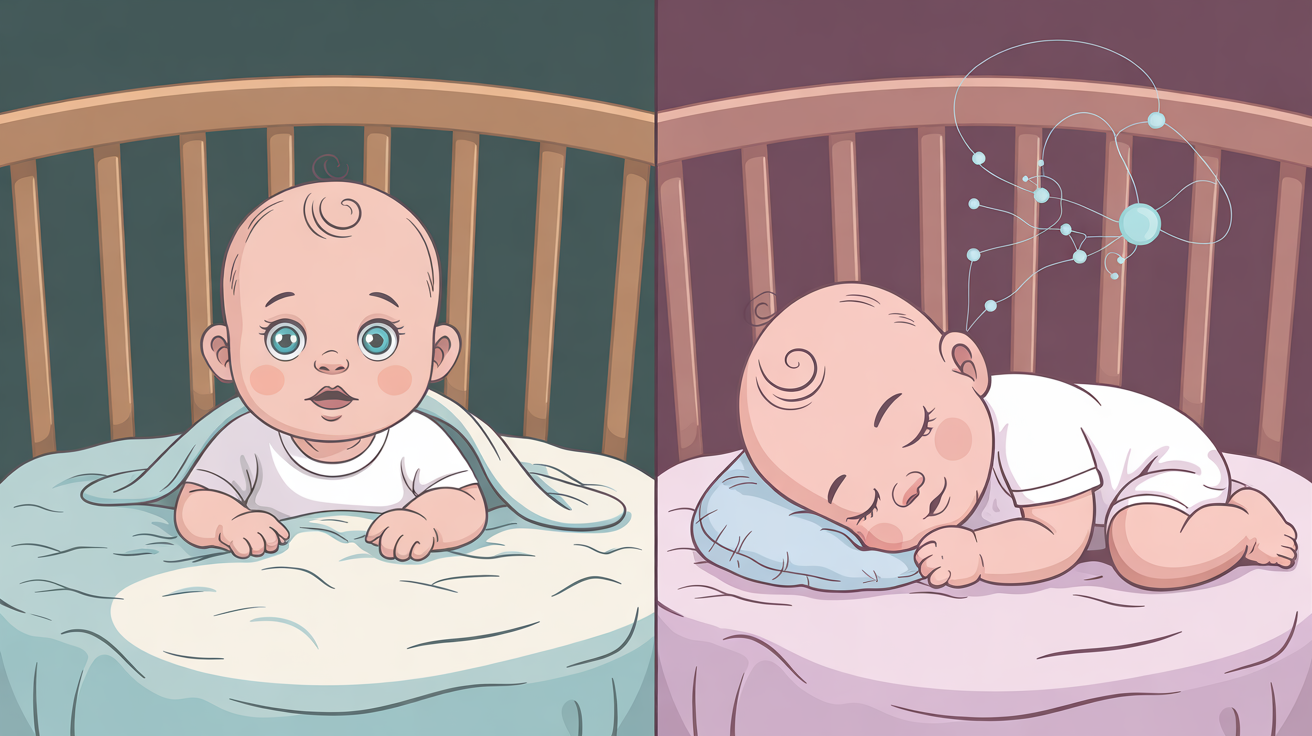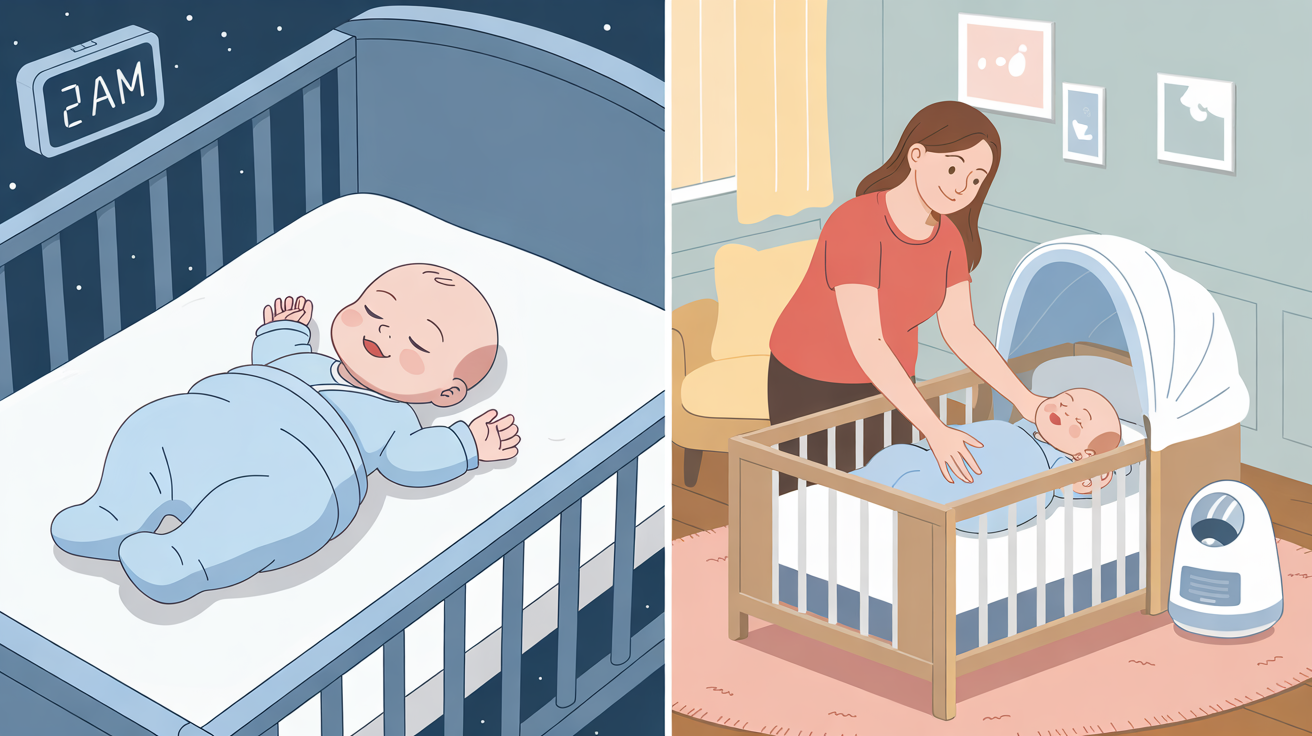
Are you surviving on coffee while your 2-month-old fights sleep like it’s their job? You’re not alone!
Welcome to the mysterious world of baby sleep patterns, where wake windows can make the difference between peaceful naps and crying marathons.
While your tiny human is adorable, they haven’t quite mastered the art of sleeping—and that’s completely normal.
We’ll unravel all the mysteries of your 2-month-old’s sleep patterns in the pages ahead, covering vital topics like optimal wake windows (which might surprise you with their brevity) and explaining that sudden shift from peaceful newborn to bedtime protester.
We’ll cover nap schedules, night feedings, and gentle ways to encourage better sleep—all backed by pediatric sleep science but written for exhausted parents who want answers.
Ready for more sleep for everyone? Let’s begin!
What Are Wake Windows for a 2-Month-Old?
Wake windows are simply how long your baby should stay awake between naps. For a 2-month-old, these windows are typically short – just 60 to 90 minutes.
That’s right! Your little one can only handle being awake for about an hour to an hour and a half before needing to sleep again. This might seem very short, but their brains are developing rapidly and need frequent rest.
How do you know when it’s nap time? Watch for sleepy cues: rubbing eyes, yawning, looking away or avoiding eye contact, fussiness, and becoming less active.
Did you know that putting your baby down to sleep before they get overtired makes it easier for them to fall asleep?
An overtired baby often fights sleep even more! Setting a timer for 60 minutes after your baby wakes up can help you start watching closely for these sleepy cues, preventing you from missing that perfect sleep window.
Understanding 2-Month-Old Sleep Patterns

Your 2-month-old is not ready for a strict schedule yet, but they are developing patterns. Here’s what you can expect:
1. How Much Total Sleep Should a 2-Month-Old Get?
Ideally, your 2-month-old needs about 15.5 hours of sleep in 24 hours. This includes both nighttime sleep and naps. Some babies sleep more, some sleep less – every baby is unique!
Remember those nights when you got 8 hours of sleep and felt amazing? Your baby needs almost twice that amount!
2. How Long Should a 2-Month-Old Sleep at Night Without Eating?
At 2 months, some babies might sleep for 4-6 hour stretches at night. Others still wake every 2-3 hours to eat. Both patterns are completely normal!
Your baby’s stomach is still small, and breast milk and formula digest quickly. Most 2-month-olds still need at least 1-2 feedings during the night.
3. What is the Ideal Bedtime for a 2-Month-Old?
There is no one-size-fits-all bedtime for 2-month-olds. Most babies this age go to bed between 7 and 10 p.m.
Pay attention to your baby’s natural rhythms. Some babies are ready for bedtime as early as 6:30 pm, while others might not settle until later.
Let me share something surprising: an earlier bedtime often leads to better sleep! It sounds backward, but going to bed when overtired makes it harder for babies to stay asleep.
4. How Many Naps Should a 2-Month-Old Have?
At 2 months old, babies typically take 4-6 naps a day. These naps might be short – sometimes just 30-45 minutes, though some babies take longer naps. Don’t worry if your baby’s naps seem all over the place. Nap schedules at this age are still developing.
Sample 2-Month-Old Sleep Schedule
Remember, this is just an example. Your baby’s schedule might look very different:
| TIME | ACTIVITY |
|---|---|
| 7:00 am | Wake up and feed |
| 8:00–8:30 am | First nap |
| 9:30 am | Feed |
| 10:30–11:30 am | Second nap |
| 12:30 pm | Feed |
| 1:30–2:30 pm | Third nap |
| 3:30 pm | Feed |
| 4:30–5:00 pm | Fourth nap |
| 6:00 pm | Feed, bathe, bedtime routine |
| 7:00 pm | Bedtime |
The key is flexibility. Follow your baby’s lead while gently guiding them with consistent wake windows.
PRO TIP: Keep a simple sleep log for 3 days. Note when your baby wakes, sleeps, and eats. You’ll likely see patterns emerge that can help you create a flexible routine that works for YOUR baby.
Developmental Milestones for a 2-Month-Old
Did you know that sleep and development go hand in hand? At 2 months, your baby is reaching exciting milestones:
- Holding their head up during tummy time
- Smiling in response to your voice or face
- Making cooing sounds
- Following objects with their eyes
- Becoming more alert and engaged
These developments are amazing but can also affect sleep. Sometimes, babies are so excited about their new skills that they have trouble settling down!
Give your baby plenty of tummy time and play during those wake windows. This helps them practice new skills and may help them sleep better.
Why Is My 2-Month-Old Fussy?

“My baby was so calm as a newborn. What happened?” This is a common question!
At around 2 months, many babies become fussier. Common reasons include:
- Over-tiredness: Remember those short wake windows? Staying awake too long can lead to fussiness.
- Hunger: Growth spurts around this age can increase appetite.
- Reflux or gas: Digestive systems are still maturing.
- Witching hour: Many babies have a fussy period in the late afternoon or evening.
Sometimes, the solution is as simple as offering a nap earlier or adding an extra feeding.
Have you heard of the 5 S’s? Swaddling, side/stomach position (while supervised), shushing, swinging, and sucking can be miracle workers for fussy babies!
Sleep Regression and Sleep Challenges

Good news! There’s no official “2-month sleep regression.” However, your baby is going through major developmental changes that can disrupt sleep.
If your baby suddenly wakes more often or fights sleep, don’t worry – it’s normal and temporary. Keep offering regular naps based on wake windows and maintain a consistent bedtime routine.
Feeding and Sleep
Establishing consistent feeding and sleep routines helps babies thrive. Newborns typically feed 8-12 times daily, gradually extending intervals as they grow.
Sleep needs range from 14-17 hours for newborns to 11-14 hours for toddlers. Both patterns evolve together, with night feedings decreasing as babies develop self-soothing skills.
Regular schedules promote healthy development and parental well-being.
How Much Should a 2-Month-Old Eat?
Most 2-month-olds eat every 2-3 hours during the day, though some may go slightly longer between feedings. Formula-fed babies typically take 4-5 ounces per feeding, while breastfed babies generally feed for about 20-30 minutes.
Hunger is a common reason for sleep disruptions. If your baby wakes early from a nap or night’s sleep, food might be what they need.
Can a 2-Month-Old Sleep Through the Night?

While some parents might hear stories about 2-month-olds sleeping through the night, the truth is that most babies this age still need nighttime feedings.
“Sleeping through the night” at this age often means a 5-6 hour stretch—not 12 hours straight. Many babies won’t sleep that long without eating until they’re older and consume more calories during the day.
Swaddling and Sleep Safety
Swaddling can be a wonderful sleep tool for young babies. It mimics the snug feeling of the womb and prevents the startle reflex from waking them.
However, safety is crucial:
- Always place your baby on their back to sleep
- Use a firm, flat sleep surface with no loose bedding, toys, or pillows
- Keep the room at a comfortable temperature to prevent overheating
Important: Once your baby shows signs of rolling (which can happen around 2-3 months), it’s time to transition out of the swaddle. Many “transitional” swaddle products keep arms free but still provide that cozy feeling.
Sleep Training: Is It Too Early?
Formal sleep training methods are not recommended for babies under 2 months. Your baby is too young to self-soothe consistently.
However, you can begin building healthy sleep habits:
- Place your baby in the crib awake but drowsy sometimes
- Establish a simple bedtime routine
- Create a sleep-friendly environment (dark room, white noise)
- Begin to distinguish between day and night activities
These gentle approaches help build a foundation for good sleep without putting pressure on your baby to self-soothe before they’re ready.
PRO TIP: Start a consistent, simple bedtime routine now – even if it’s just 10-15 minutes. The familiar sequence (like bath, massage, pajamas, feeding, lullaby) signals to your baby that sleep time is coming.
Activities to Help Your 2-Month-Old Sleep Better

The activities you do during wake windows can impact sleep quality. Try these:
- Tummy time: Strengthens neck and core muscles, tires babies out in a good way
- Talking and singing: Stimulates language development
- Reading: Even at this young age, babies benefit from hearing your voice
- Simple black and white toys: These high-contrast images are fascinating for young babies
Remember to watch for sleepy cues, and don’t overstimulate. Sometimes, less is more!
Final Thoughts
The 2-month stage is both challenging and wonderful. Your baby is becoming more alert and engaging, but still needs lots of sleep to support their rapid development.
Be patient with yourself and your baby as you guide this time. Perfect sleep rarely happens at this age – and that’s completely normal!
Focus on watching wake windows, responding to your baby’s cues, and maintaining flexible routines. Before you know it, your little one will be moving into new sleep patterns as they continue to grow.
What sleep questions do you have about your 2-month-old? Every baby is unique, and sharing experiences with other parents can be incredibly helpful!
If you’re interested in more informational content on mothers and babies, feel free to click here and research other blogs that you might enjoy.
